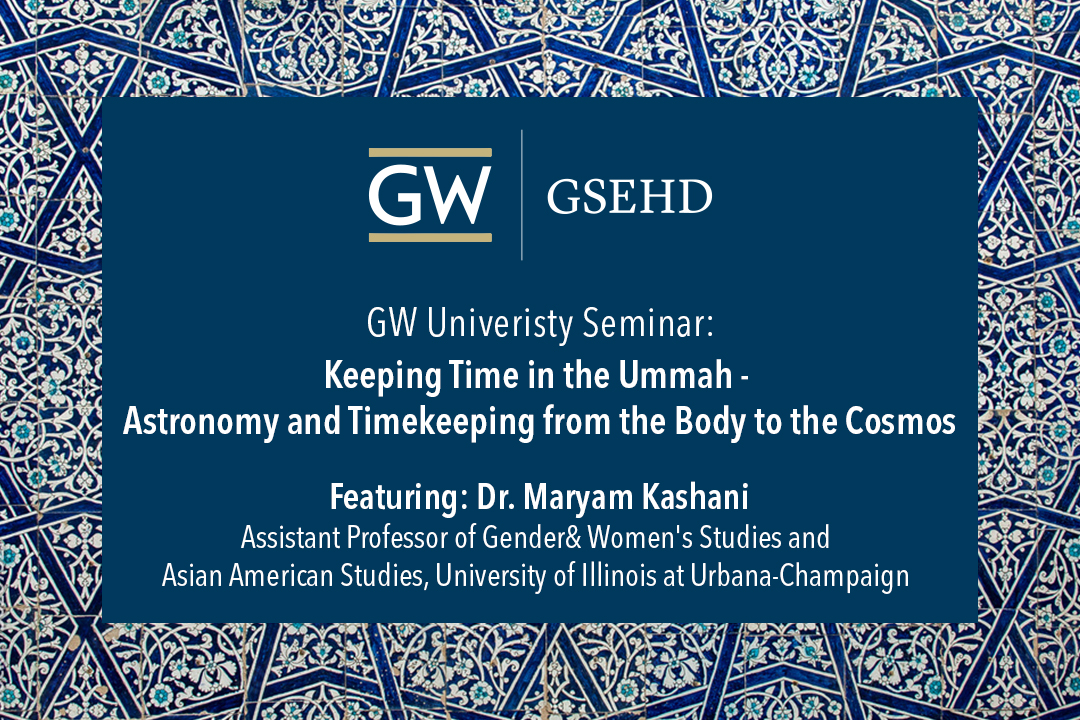Featuring:
- Dr. Maryam Kashani, Assistant Professor of Gender& Women's Studies and Asian American Studies, University of Illinois at Urbana-Champaign
Moderated by:
- Dr. Arshad I. Ali, GW Associate Professor of Educational Research
- Dr. Ebtissam Oraby, GW Teaching Assistant Professor of Arabic and GSEHD Alumna (Ed.D., Curriculum and Instruction)
Astronomy (‘ilm al-falak and ‘ilm al-ḥay’a) and timekeeping (‘ilm al-tawqīt) hold prestigious positions in the historical discourses of Islam and science and continue to inform everyday Muslim life due to their foundational roles in determining when to pray and fast. This article situates scientific discourse and practices at an American Muslim liberal arts college within an embodied and ethico-political terrain of somatic attunement, communal relations, and citizenship. I argue that rather than a debate about traditionalist versus modernist interpretations of Islam, cultivating certainty and managing controversy about prayer times and the beginning and end of Ramadan demonstrate how attending to a particular sensorium works with and against desires for communal and national belonging at multiple scales through colonial racial capitalist time.
Maryam Kashani is a filmmaker and assistant professor in Gender and Women’s Studies and Asian American Studies at the University of Illinois at Urbana-Champaign and is an affiliate with Anthropology, Media and Cinema Studies, the Center for South Asian and Middle Eastern Studies, and the Unit for Criticism and Interpretive Theory. Her forthcoming book Medina by the Bay: an Ethics of Knowledge and Survival (Duke University Press, 2023) is based on ethnographic research and filmmaking conducted with Muslim communities in the greater San Francisco Bay Area. Her films and video installations have been shown at film festivals, universities, and museums internationally and include things lovely and dangerous still (2003), Best in the West (2006), las callecitas y la cañada (2009), and Signs of Remarkable History (2016); she is currently working on two film duets with composer/musician Wadada Leo Smith that examine the ongoing relationships between the struggles for Black freedom, creative music, and spirituality. Kashani is also in the leadership collective of Believers Bail Out, a community-led effort to bailout Muslims in pretrial and immigration incarceration towards abolition.
Learn More about the GW University Seminar:
“And the Earth was Laid Out for All Living Beings” - Muslim Epistemologies, Science, and Non-western Ways of Knowing
This series of conversations, hosted by Dr. Arshad I. Ali and Dr. Ebtissam Oraby, explores the intersection of education, science, and Muslim epistemologies. We aim to expand our understanding of who knowers can be and what ways of knowing are valued. We aim to understand what science means across diverse non-western knowledge systems.
For education to engage all young people, we must cultivate learning in a polyverse of scientific epistemologies and not simply rely upon Westernized conceptions of knowledge. By expanding notions of science and scientific epistemology, not only can more diverse individuals pursue scientific knowledge, but we can cultivate opportunities for more diverse questions to address our current ecological crisis, for example.


